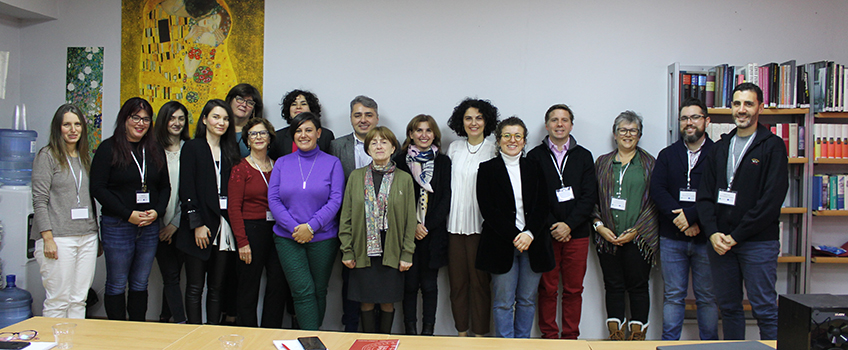From December 5 to 8, the Iberoamerican University Foundation (FUNIBER) together with the other members of the Erasmus+ CBHE LOVEDIST@NCE (Learning Optimization and Academic Inclusion Via Equitable, Distance Teaching and Learning) project, participated in a meeting in Georgia to monitor and evaluate the results of the online education courses designed in the country, especially for minority ethnic groups (from Armenia and Azerbaijan, among others), residents of rural areas, and foreigners.
Thomas Prola, researcher and project manager at FUNIBER, recalls the delicate moment in which the pilot courses were developed in the country, after the pandemic was declared at the beginning of 2020. As a context “softened by the solutions put in place from the year-end 2020 education in Barcelona”.
The project, supported by the European funding agency EACEA (Education, Audiovisual and Culture Executive Agency), is coordinated by the Instituto Politécnico do Porto (IPP) of Portugal with the participation of FUNIBER- Instituto Universitario de Investigación de la Universidad Europea del Atlántico-.
During the week of monitoring, the partners visited the three educational institutions participating in the project: the state universities of Batumi Shota Rustaveli (BSU), Ilia (ISU) and Telavi (TESAU), located in the cities of Batumi, Tblisi, and Telavi respectively. The partners met with students and academic and administrative staff at each organization to learn more about their experiences with the online education courses.
Nino Mikeladze, researcher and administrative staff at BSU, and one of the attendees of the education for educators led by FUNIBER in November 2020, developed a course on teaching English as a foreign language attended by more than a dozen students.
The researcher stressed that the education received was “of great help in learning about certain digital tools” and added that she already perceived a significant change in the students thanks to methodologies that encourage student participation and evaluation: “The education worked: The students were happy, learned and became more interested, which increased their motivation and commitment.”
Difficult access to the Internet, both for geographic and socioeconomic reasons, and the lack of technological equipment were some of the major drawbacks to completing these online educations. In response to this problem, universities developed dedicated recording platforms to send the material to students and encourage asynchronous study.
Lack of learning skills was another major problem cited by those teachers who developed the pilot courses. “We had to start at the lowest level and give them skills to prepare homework, how to write, how to learn, and try and help them integrate” highlights Teona Damenia, a professor of the Georgian language course for foreign students at the University of Ilia in the country’s capital.
Students from the Ponupong Sangtob and Maibam Lembasana institution agree on this lack of skills: “It’s a dynamic with new digital tools.
Not everything is a drawback. The time saved by avoiding commuting to school and the possibility of adequately combining studies and work are two positive factors for students to opt for online education. “One of the best things about online education is its flexibility,” students point out.
Georgia is a country with great cultural diversity, which is reflected in its academic environment. Georgian universities have developed pilot courses related to different topics: English language learning, introduction to the Georgian language, a culturally focused educational program, technological skills training and even a course focused on the fundamentals of toxicology.
“During our trip to Batumi, Tbilisi and Telavi, we saw a dynamic country, proud of its roots, focused on its future and its inclusion in the European Union, as a possible new dynamic area, both for its economy and for its educational and human growth,” Thomas Prola concluded.
In addition to these educational courses, various initiatives have been developed during the course of the project to disseminate more information about the project. One of these proposals resulted in a podcast initiated by partners of the ONO Academic College of Israel in which they explain how to translate an online education course into a podcast format, available at the following link.
The following entities participated in the meeting together with FUNIBER: Instituto Politécnico de Oporto, Universidad Técnica de Cluj Napoca (Romania), State Universities of Ilia, Telavi y Batumi Shota Rustaveli (Georgia) and Colegio Académico de Ono, and the Colegio de Educación Levinsky (Israel).
Those interested in the project can find more about it through its website or through Facebook.
Disclaimer: The European Commission’s support for the production of this publication does not constitute an endorsement of the contents, which reflect the views only of the authors, and the Commission cannot be held responsible for any use which may be made of the information contained therein.

